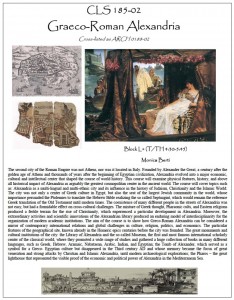 On September 7 Monica Berti will begin to teach a class on “Graeco-Roman Alexandria” at the Department of Classics, Tufts University, Medford MA.
On September 7 Monica Berti will begin to teach a class on “Graeco-Roman Alexandria” at the Department of Classics, Tufts University, Medford MA.
Course description
The second city of the Roman Empire was not Athens, nor was it located in Italy. Founded by Alexander the Great, a century after the golden age of Athens and thousands of years after the beginning of Egyptian civilization, Alexandria evolved into a major economic, cultural and intellectual center that shaped the course of world history. This course will examine physical features, history, and above all historical impact of Alexandria as arguably the greatest cosmopolitan center in the ancient world.
Topics covered
- Alexandria as a multi-lingual and multi-ethnic city and its influence in the history of Judaism, Christianity and the Islamic World: The city was not only a center of Greek culture in Egypt, but also the seat of the largest Jewish community in the world, whose importance persuaded the Ptolemies to translate the Hebrew Bible realizing the so called Septuagint, which would remain the reference Greek translation of the Old Testament until modern times. The coexistence of many different people in the streets of Alexandria was not easy, but had a formidable effect on cross-cultural challenges. The mixture of Greek thought, Pharaonic cults, and Eastern religions produced a fertile terrain for the rise of Christianity, which experienced a particular development in Alexandria. Moreover, the extraordinary activities and scientific innovations of the Alexandrian library produced an enduring model of interdisciplinarity for the organization of modern academic institutions. The aim of the course is to show how Graeco-Roman Alexandria can be considered a mirror of contemporary international relations and global challenges in culture, religion, politics, and economics.
- The particular features of the geographical site, known already in the Homeric epics centuries before the city was founded.
- The great monuments and cultural institutions of the city:
- the Library of Alexandria and the Museum, the first and most famous international scholarly center of the classical world, where they promoted a wide range of studies and gathered a huge collection of books in many different languages, such as Greek, Hebrew, Aramaic, Nabataean, Arabic, Indian, and Egyptian;
- the Tomb of Alexander, which served as a symbol for a Graeco-Egyptian culture but disappeared in the Third century AD and whose memory became the focus of great veneration and strong attacks by Christian and Islamic Alexandria, until modern archaeological explorations;
- the Pharos – the great lighthouse that represented the visible proof of the economic and political power of Alexandria in the Mediterranean Sea.